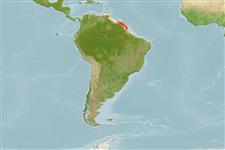Classification / Names
ชื่อสามัญ | ชื่อพ้อง | Catalog of Fishes(สกุล, ชนิด) | ITIS | CoL | WoRMS | Cloffa
>
Ophidiiformes (Cusk eels) >
Ophidiidae (Cusk-eels) > Ophidiinae
Etymology: Lepophidium: Latin, lepus, leporis = rabbit + Greek, ophis = serpent (Ref. 45335); collettei: Named for Bruce B. Collette..
Environment: milieu / climate zone / depth range / distribution range
นิเวศวิทยา
เกี่ยวกับทะเล,น้ำเค็ม สัตว์น้ำหน้าดิน; ระดับความลึก 7 - 66 m (Ref. 91765). Tropical; 12°N - 1°S, 64°W - 45°W (Ref. 91765)
Western Atlantic: Shelf waters off the mouth of the Amazon and along the Guianan coast to the Gulf of Paria between Trinidad and Venezuela.
ขนาด / น้ำหนัก / Age
Maturity: Lm ? range ? - ? cm
Max length : 16.4 cm SL เพศผู้/กระเทย; (Ref. 91765)
Short description
สัณฐานวิทยา | ความยาวต่างๆ
ก้านครีบอ่อนที่หาง (รวม): 116-122; ก้านครีบอ่อนที่ก้น: 96 - 103; สัตว์มีกระดูกสันหลัง: 65 - 69. This species can be distinguished from all its congeners on the basis of vertebral counts (only Lepophidium aporrhox has fewer vertebrae than L. collettei with no overlap in number of precaudal vertebrae, 14-15 vs. 12-13 in L. aporrhox). L. collettei differs further from L. aporrhox in dorsal rays (116-122 vs. 106-115), rudiments on lower gill arch (2-7 vs. 8-12), length of the long (9-11% vs. 13-18%) and short pelvic rays (5-7% vs. 8-12%) in SL; differs from L. brevibarbe in the absence of a distally expanded anterior rib in males or haltere as seen in L. brevibarbe, developed rakers on the lower gill arch (6-8 vs. 4-5), and in having a deeper body; from L. gilmorei by the average number of caeca (5.4 vs. 3.2), total gill raker elements (12-17 vs. 8-9), dorsal fin origin (between neural spines 4-5 and 5-6 vs. between 3-4); from L. marmoratum by caudal vertebrae (51-54 vs. 55-58), short pelvic rays as a percentage of standard length (5-7% vs. 8-12%), and lack of dark spots on the head and body, in rows or otherwise; from the Pacific L. microlepis by average head length (20.8% vs. 24.3% in SL) and long pelvic rays (9-11% vs. 5-8% in SL); on the basis of dorsal rays (116-122), from L. pheromystax (125-133), L. robustum (123-126), and L. stigmatistium (123-131) Ref. 91765.
Life cycle and mating behavior
วัยเจริญพันธุ์ | การสืบพันธุ์ | การวางไข่ | เซลสืบพันธ์ของเพศเมีย(ไข่) | ความดกของไข่ | ตัวอ่อน
Robins, C.R., R.H. Robins and M.E. Brown, 2012. A revision of Lepophidium (Teleoastei, Ophidiidae), with descriptions of eight new species. Bulletin of the Florida Museum of Natural History 52(1):1-94. (Ref. 91765)
IUCN Red List Status (Ref. 130435)
Threat to humans
Harmless
Human uses
ข้อมูลเพิ่มเติม
ชื่อสามัญชื่อพ้องกลไกการเผาผลาญพลังงานผู้ล่าการศึกษาเกี่ยวกับผลกระทบของสารประกอบทางเคมีที่เป็นอันตรายต่อสิ่งมีชีวิต ประชากร และสิ่งแวดล้อมการสืบพันธุ์วัยเจริญพันธุ์การวางไข่การรวมกลุ่มวางไข่ความดกของไข่เซลสืบพันธ์ของเพศเมีย(ไข่)Egg development
Age/SizeการเจริญเติบโตLength-weightLength-lengthLength-frequenciesความยาวต่างๆสัณฐานวิทยาตัวอ่อนพลวัตของสัตว์น้ำวัยอ่อนการทดแทนที่อุดมสมบรูณ์BRUVS
อ้างอิงการเพาะเลี้ยงสัตว์น้ำประวัติการเพาะเลี้ยงสัตว์น้ำสายพันธุ์พันธุศาสตร์ElectrophoresesอัตราพันธุกรรมโรคการแปรรูปNutrientsMass conversion
ผู้ร่วมมือรูปภาพหลายรูปStamps, Coins Misc.เสียงปลามีพิษ เช่น ปลาปักเป้าความเร็วรูปแบบการว่ายน้ำพื้นที่เหงือกOtolithsสมองวิสัยทัศน์
เครื่องมือ
Special reports
Download XML
แหล่งที่มาจากอินเตอร์เน็ต
Estimates based on models
Preferred temperature (Ref.
123201): 26.6 - 28, mean 27.4 °C (based on 60 cells).
Phylogenetic diversity index (Ref.
82804): PD
50 = 0.5000 [Uniqueness, from 0.5 = low to 2.0 = high].
Bayesian length-weight: a=0.00102 (0.00046 - 0.00225), b=3.06 (2.88 - 3.24), in cm total length, based on all LWR estimates for this body shape (Ref.
93245).
ระดับชั้นอาหาร (Ref.
69278): 3.5 ±0.7 se; based on size and trophs of closest relatives
ความสามารถในการกลับคืนสู่ปกติ (Ref.
120179): ความสูง, เวลาต่ำสุดที่จะทำให้ประชากรเพิ่มขึ้นเป็น 2 เท่าใช้เวลาน้อยกว่า 15 เดือน (Preliminary K or Fecundity.).
Fishing Vulnerability (Ref.
59153): Low vulnerability (10 of 100).
